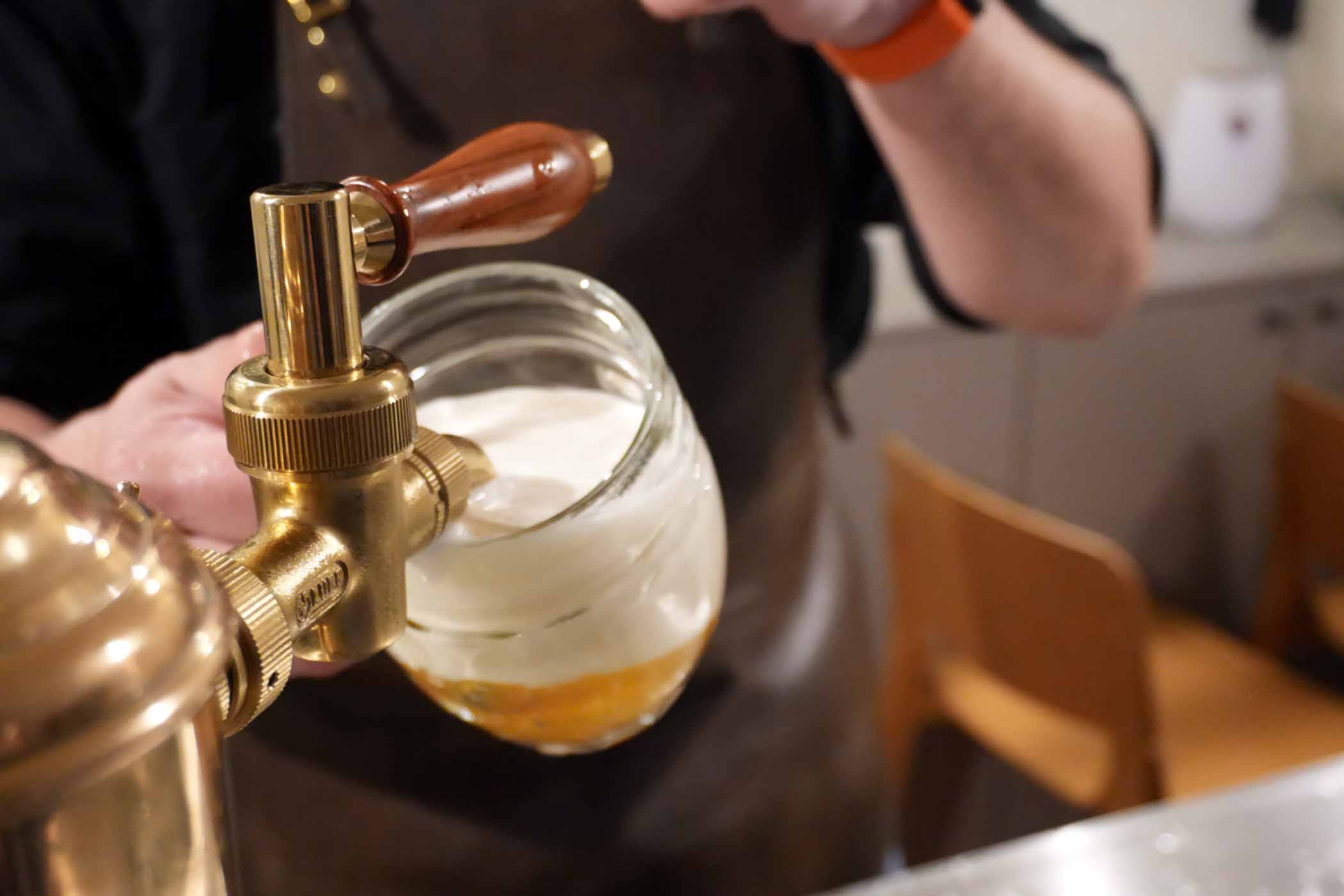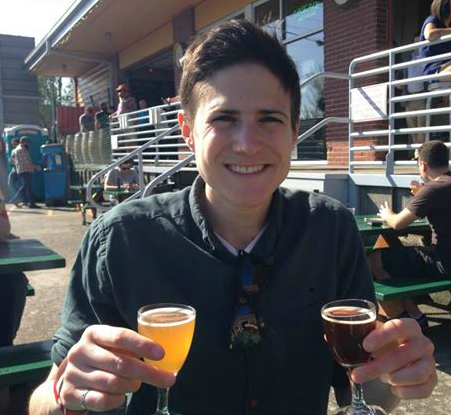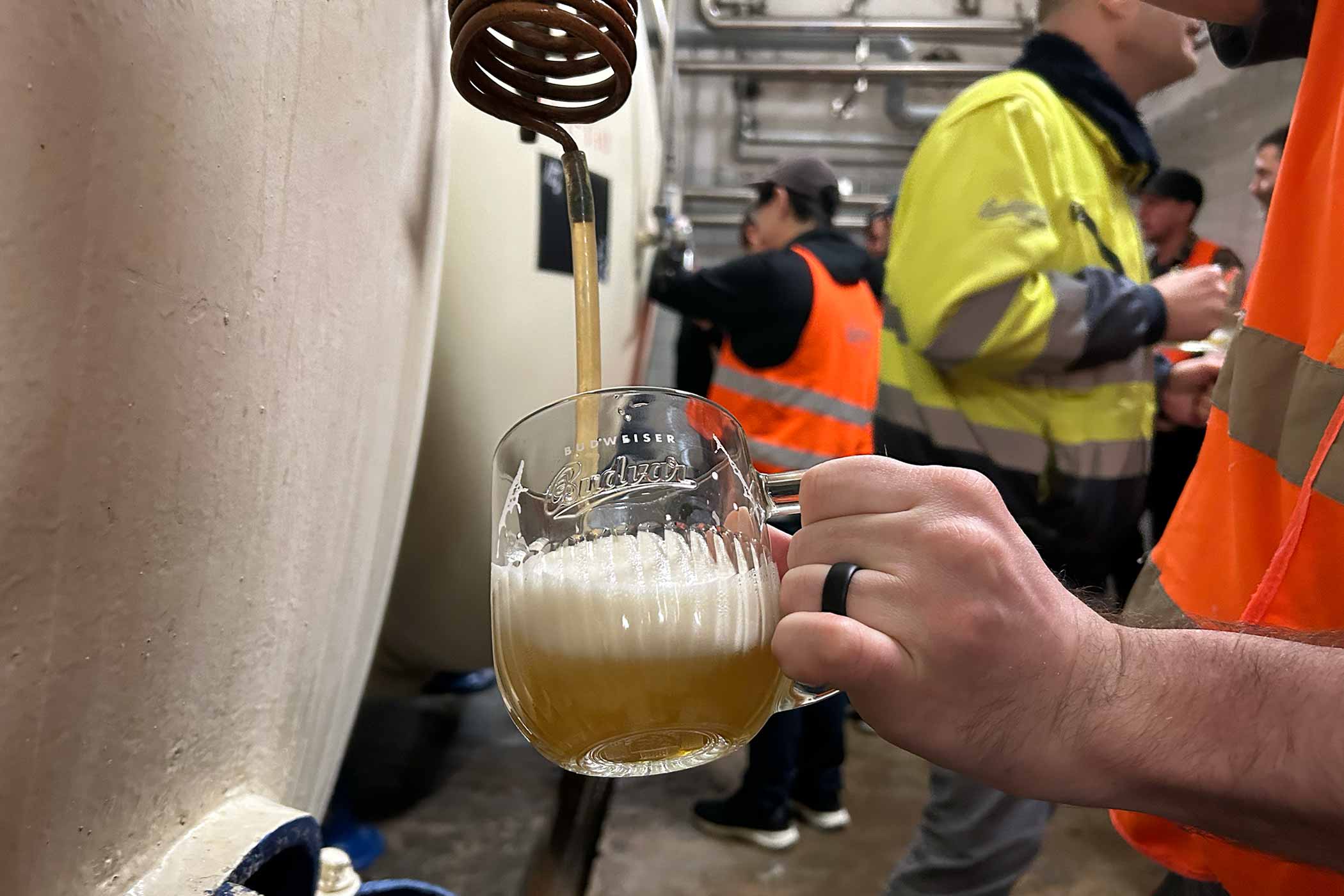Shop
A Day in the Life of a Czech Tapster
1 million beers poured and counting.
Looking for More From Czechia?
Editor’s Note: This is the fifth in a series of articles created in collaboration with the Czech Ministry of Agriculture that invited Hop Culture to join a group of American and Canadian brewers on a trade mission trip to the country to learn more about Czech brewing and ingredients.
Our Favorite Breweries and Bars to Visit in Czechia
Pivovar Proud: The Electrifying, Experimental Brewery at Pilsner Urquell
Kazbek: Everything You Need to Know About This Surprising Czech Hop
The Czechs have a saying that goes something like this: “The brewer brews the beer, but the tapster makes it.”
In Czechia, drinking isn’t just about the beer. It’s also about the person who poured you that beer—the tapster.
Each has their own approach—nuances to pouring, presenting, and serving that beer to you.
And it all matters.
A very proud drinking culture, Czechs tend to favor one specific beer producer and a few certain bars known for the person pouring the beer.
“Mostly people are not going only to a pub here in Czechia,” explains Ondřej Rozsypal, the head tapster at LUKR, the company known for making the now-famous side-pull taps. “They’re mostly going for the tapster, for the special one, because they like the taste of a beer from a [certain] tapster.”
For that reason, people drink one or two brands religiously. Budějovický Budvar’s On-Trade Quality Manager and Tapster, Alexandr Vitek, says he started tasting beers with his dad. “In Czechia, it’s much more focused on lager because we are a very proud lager nation,” he explains. “So it’s very difficult to get people, especially those who have been drinking this one brand of their favorite beer their whole life, to try something new.”
Jan Havránek, head of international sales and marketing at LUKR agrees, saying people, “keep on drinking that beer, all the time, every day, the same beer.” Havránek himself admits that he regularly frequents the same five places in Plzeň where he knows the tapsters. “It’s the same beer in the same kegs from the same brewery, maybe from the same day,” he says. “But I’m not going for the brand; I’m going to visit the tapster.”
When Green Bench Brewing Company Head Brewer and Co-Founder Khris Johnson visited Czechia several years ago on a trade mission trip organized by the Czech Ministry of Agriculture, he found that “Czech beer isn’t always about the beers; it’s more than that. It’s about the experience—where you are, who you’re with, how it’s poured, who’s serving it, and who you are in that moment.”
So much so that if something goes wrong with the beer, guess who gets blamed?
The tapster.
“They won’t say this Pilsner Urquell sucks; they’ll say these guys don’t know how to pour Pilsner Urquell,” said Johnson. “Here, you go to a bar, drink any of our beers, and hate it, you blame us. You don’t blame the place, you don’t blame their line cleaning, you don’t blame the transit, you don’t blame the wholesaler, you blame the brewer. The brewer f**ked it up.”
Magda Hoppová, who has worked as a tapster for the last five years at Dva Kohouti and PULT in Prague, says you can tell if a tapster isn’t focusing on the quality.
“You can definitely taste it in the beer when you order it, and they’re not focusing on cleaning or quality,” she explains. “You can smell, taste, and see it in the beer.”
Rozsypal agrees, saying, “When the brewmaster brews the beer the perfect way, the best way they can, the tapster can destroy it very easily.”
Making the tapster an indispensable link in the hospitality chain.
In America, we often view bartending as a pitstop on the way to a “real” full-time job, whereas the Czechs consider the tapster a well-respected career.
“In Czechia, being a tapster is not some part-time job or an intern who goes to the bar just to make money,” says Havránek. “It’s really a valued craft.’
When we joined this Czech trade mission trip for ourselves back in April, we sat down with three different tapsters we met along the way to talk about their routine, the little details that make a great tapster, and what it’s like to serve sometimes upwards of 2,000 beers a day.
Magda Hoppová – Tapster at PULT

Photography courtesy of Radim Zvánovec
Five years ago, while in college, PULT Tapster Magda Hoppová was teaching speed skating to kids in Prague over the summer when a new pub opened—Dva Kohouti. Looking for something else to do in her free time, she applied to work as a tapster at the now well-known pub from the Ambiente group.
After three years of learning the ropes, she transitioned to PULT when it opened.
For her, being a tapster has become a way of life.
A typical day starts well before the pub opens, getting to PULT at least an hour early to clean.
“You have to prepare everything before the shift starts because all the taps must be one hundred percent clear and clean all the time,” says Hoppová.
Cleaning is one of a tapster’s most essential tasks. Dirty draft lines can affect the quality of the beer, which in turn affects the consumer’s experience.
Hoppová says that at PULT, not only do they clean the taps before and after a shift, but they also clean the tap tower and all of the hoses weekly.
While Hoppová says you can pay to have a third party come in and do this for you, at PULT and the other pubs in the Ambiente group, they believe in doing it themselves.
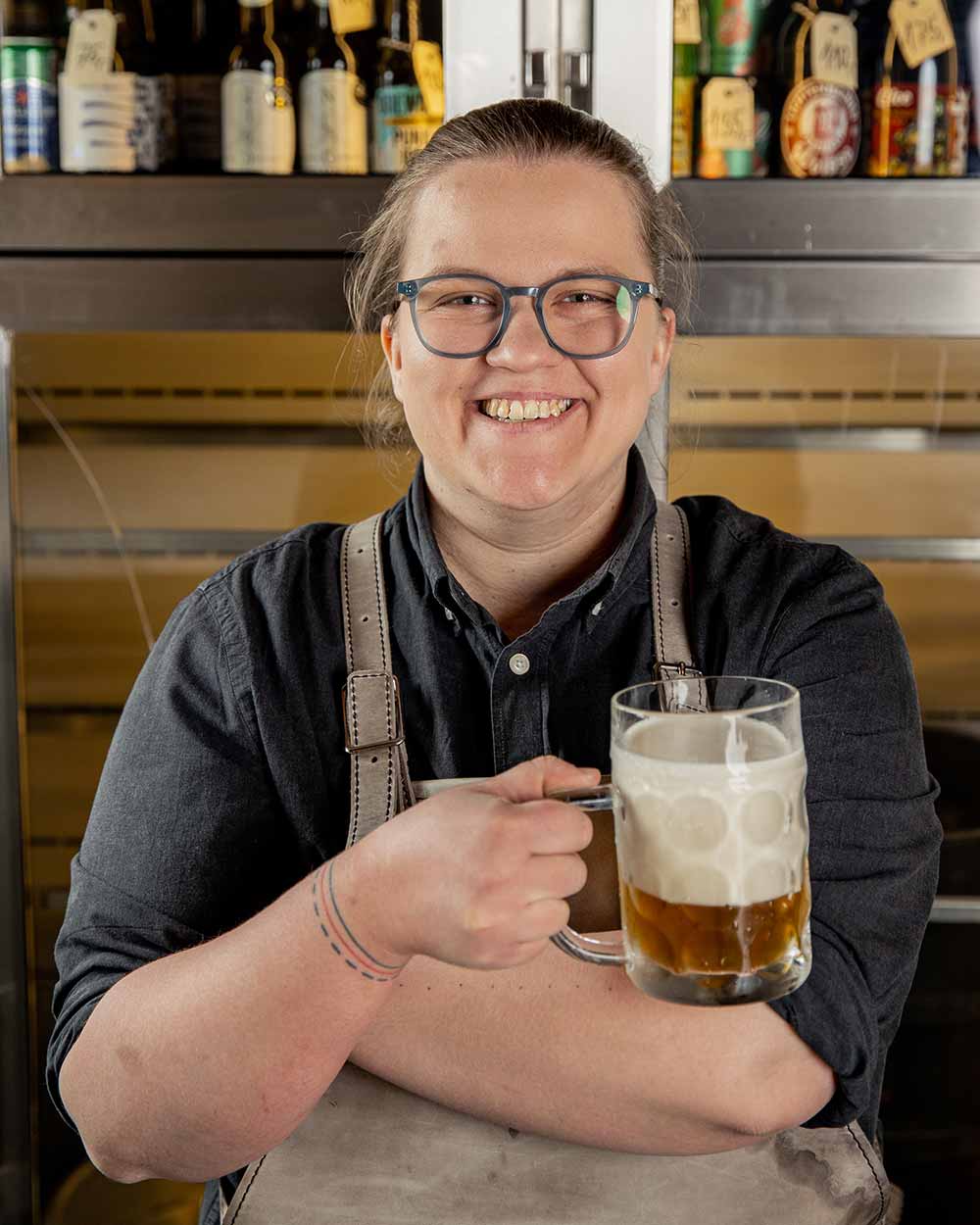
Photography courtesy of Kuba Zeman
Meaning once a week, Hoppová adds an extra three hours to her day.
“We are going to sleep around 3 a.m., and then the next day, we have to be at work at 2 p.m., so it means that to go there to clean these things, I have to be there by at least 11 a.m. to be done at 2 p.m., so it’s better to do it before a shift,” she explains. “It’s a longer day for me, but I don’t have to go there in my free day.”
During her shift, Hoppová spends around ten hours pouring an average of 300 liters of beer a day, depending on how busy they get.
“PULT is a very tiny ten-table pub, so I think there is no chance to make it double and go over 600 [liters], but working at Dva Kohouti, you’re used to doing over 1,000 liters a day, which is around 2,000 beers,” she explains.
For Hoppová, the most crucial role of a tapster is taking care of the beer. “You should know how the perfectly poured beer should look and try to make every single beer the very same as the previous one,” she says.
It’s an art and a science. We’ve extensively covered “The Proper Czech Pours” before, but here’s a brief recap.
Everything starts with a glass you clean by hand, which is why you’ll find every tapster in PULT wearing a leather apron. “Not wearing one, I would rather be in a swimsuit,” laughs Hoppová, “because you get wet very easily.”
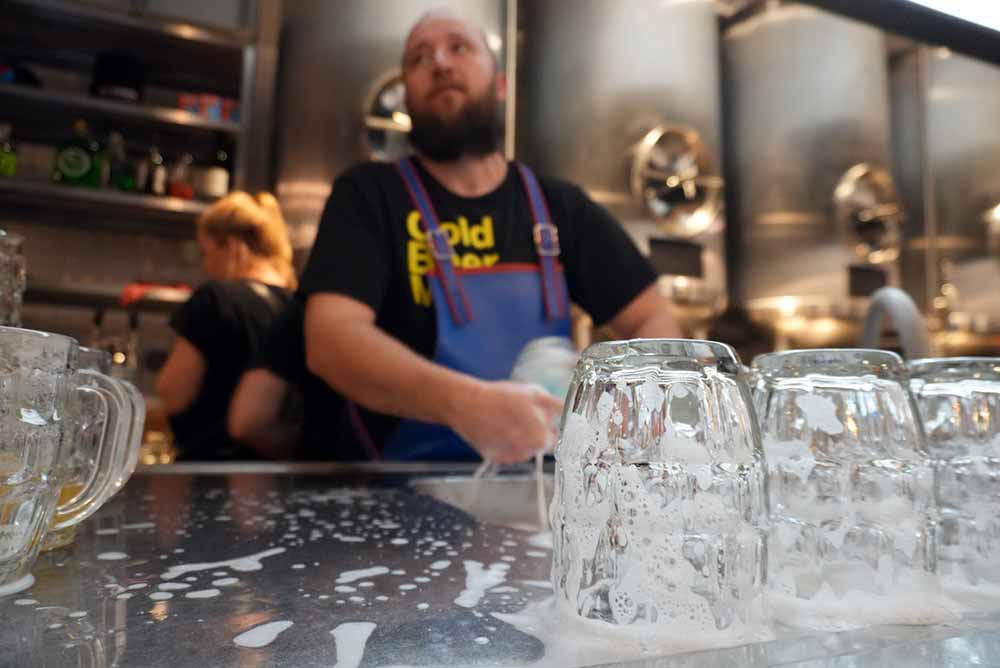
Washing glasses at Dva Kohouti | Photography courtesy of Grace Lee-Weitz | Hop Culture
The clean glass goes into a cold water bath, where it will sit until ready to pour. Each type of pour at PULT—Hladinka, Šnyt, or Mlíko—follows a particular set of steps, emphasizing building various ratios of a wet, drinkable, dense foam to beer.
But Hoppová says being a tapster goes beyond mastering your pouring technique. Honestly, she says the job is less physical and more mentally demanding “to be able to spend ten, twelve, fourteen hours with customers asking a lot of things and people getting drunk the later they visit,” she says, explaining you get used to the rigors of the job. “It’s a lot of hours standing, yes, in the beginning, maybe using your hands in a specific position, but it takes a few weeks, and you get used to it the more kegs you lift every day.”
Although male-dominated for a long time, the role of the tapster has shifted in recent years.
“I’m not able to make some timeline when this switched, but I’ve been working for five years, and even five years ago, there were already a bunch of female tapsters definitely in my favorite spots in Prague,” says Hoppová, emphasizing for many shifts at PULT there are only women working behind the bar. “It’s not heavy like working in a coal mine or something, so it really doesn’t matter if you’re a girl or a boy tapster.”
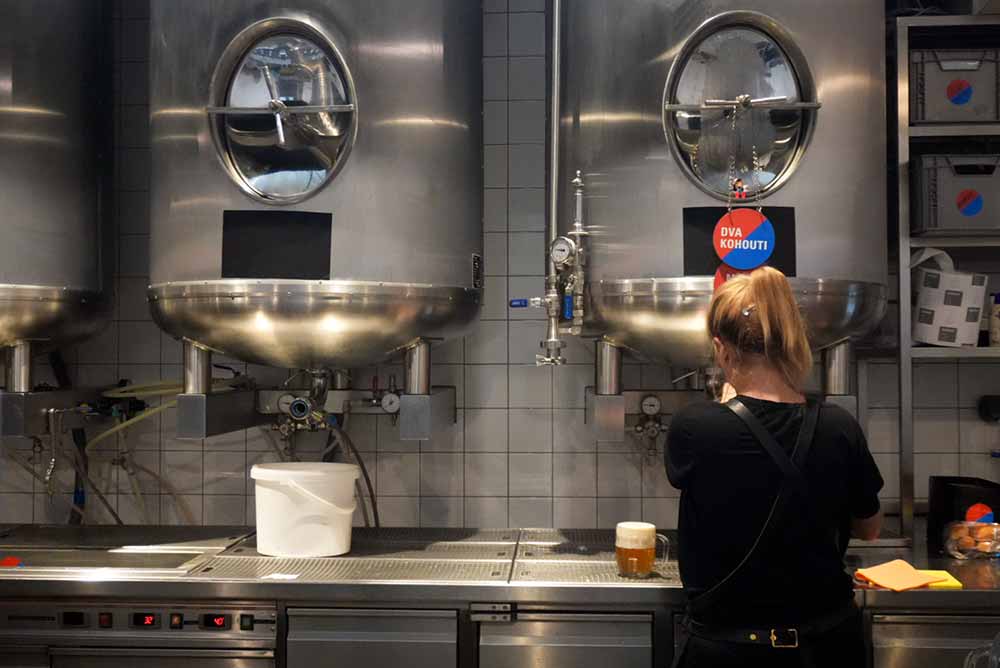
Pouring beer at Dva Kohouti | Photography courtesy of Grace Lee-Weitz | Hop Culture
She adds, “It doesn’t matter your gender in this kind of job. You can achieve all these things no matter who you are.”
When the last call comes at 1 a.m., Hoppová ends the day as she started it—cleaning.
“Depends on how busy the day was,” she says, noting that her work week fluctuates between what they call short and long weeks—only Wednesday and Thursday for the former and Monday, Tuesday, Friday, and Saturday for the latter. “It takes us one hour or maybe 1.5 hours. So we are going home around 2 a.m. Being home at 3 a.m. is a routine.”
At the moment, Hoppová doesn’t mind the long hours.
“I’m still young,” she says practically. “I don’t mind going back from work early in the morning and sleeping during the day. I enjoy it right now.”
If you’re looking for the marks of a good tapster, Hoppová says you need only ask yourself: Would you go back?
When our group of American and Canadian brewers stayed in Prague, we visited PULT at least three or four times over a couple of days.
And we weren’t the only ones. Hoppová told me the story about an old married couple who spent a few days in Prague, staying at a hotel near PULT. The first time they came in, they liked the pub so much that they came back five times in one week.
“They were going every day just to have one or two beers,” she says. “That’s a sign we do a lot of good things in here because people are coming back pretty often.”
Ondřej Rozsypal, Head Tapster at LUKR
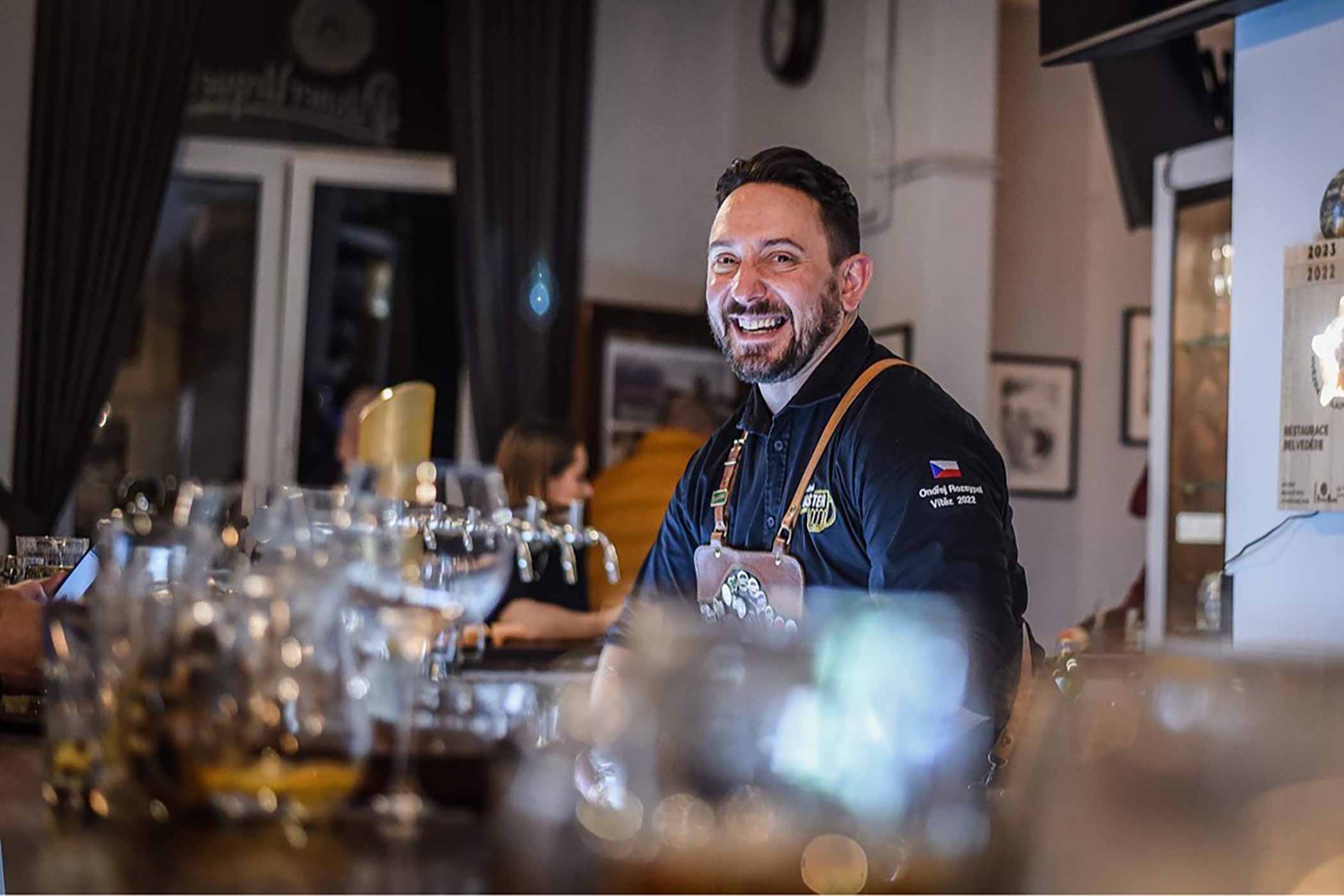
Photography courtesy of Ondřej Rozsypal
From Prague, our group traveled to Žatec and then Plzeň, visiting the headquarters of LUKR. A former sport shooter who competed for the Czech national team, LUKR Head Tapster Ondřej Rozsypal started working as a tapster because he simply loved beer. After moving to Plzeň and becoming a regular at a pub called Šeříkovka, one of the head tapsters, Martina Navrátilová, showed him how to pour his first beer.
He got hooked, tapping at six different pubs across Plzeň and Prague, including Šeříkovka, Dvacítka, Sokolovna Bolevec, and eventually landing his dream job at Lékárna.
In 2022, Rozsypal earned the title of Pilsner Urquell Master Bartender, a prestigious competition started by Pilsner Urquell to test a tapster’s skills. What begins as a group of 400 tapsters from Czechia and Slovakia whittles down to twenty finalists who must master five different disciplines, from blind tastings to theoretical tests to tapping exhibitions.
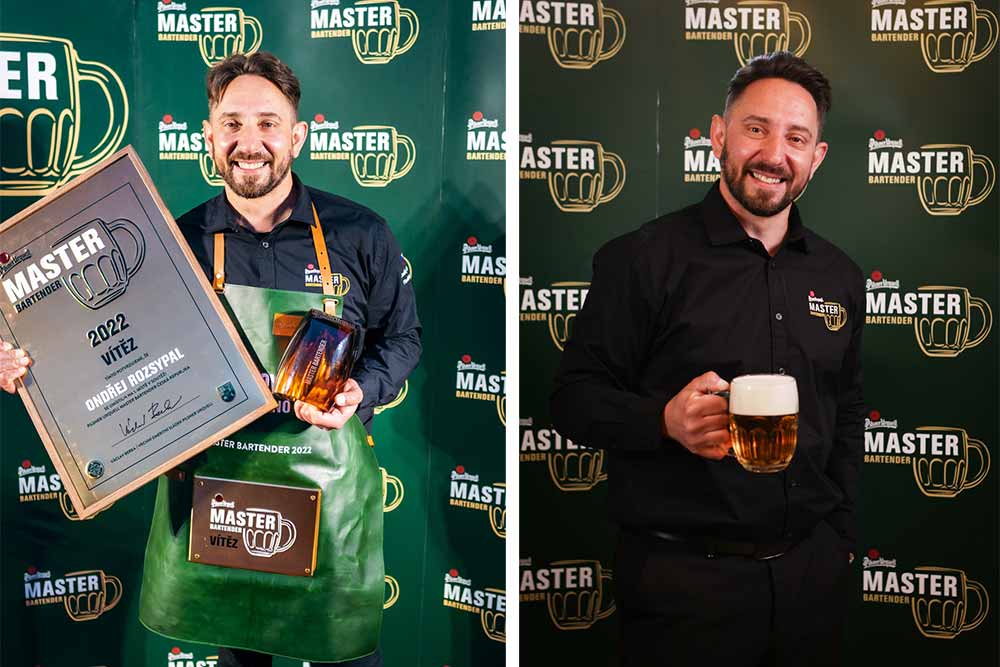
Photography courtesy of Ondřej Rozsypal
Winning the competition means you are a top-notch tapster, a rarefied air currently only shared between eighteen people.
With only three opportunities to participate in the finals, Rozsypal won on his final attempt.
“When I think about that day, it brings tears to my eyes,” he says.
Today, the nine-year veteran serves as LUKR’s head tapster, giving demonstrations and teaching others in the industry the tricks of his trade.
For Rozsypal, the role of the tapster goes beyond just pouring beer. “It’s also a care about the beer when it comes from the brewery to the pub,” he says. “From the cellar to the tap to the glass and the serve.”
According to Rozsypal, a great tapster wants to control everything from the beer line cleaning to the tapping.
“Tapping beer procedure is very simple. It’s about a few simple steps, but you must do all of them,” he explains. “If you miss one, then in the end, the result will not be that good.”
Similar to Hoppová, Rozsypal says his job starts with cleaning.
He cleans the beer lines at least once a week. “When it’s dirty, you can destroy the taste,” he says.
Before he starts pouring, he cleans his hands, telling me, “The hands of a tapster are clean like the hands of a surgeon.”
And he hand-cleans the glass.
“We say barely clean glasses,” Rozsypal explains. “It must be clean with the right detergent without any added smells or tastes.”
At LUKR, they actually have their own unique blend of detergent, developed by one of the company’s co-founders, a former chemical engineer.
Rozsypal likes the detergent so much that he uses it to wash his dishes at home. “A one-liter bottle for me lasts one year,” he says, “because you need just a small drop, and it stays on the sponge for a long time.”
After cleaning, Rozsypal dunks the beer mug in a cold water bath around 5° C, although Rozsypal says specifically he prefers to keep his at 4.2-4.5° C. The temperature of the glass should be the same as the beer because “the beer doesn’t like the difference between temperatures,” according to Rozsypal, who will change out the water twice a day to make sure it stays clean.
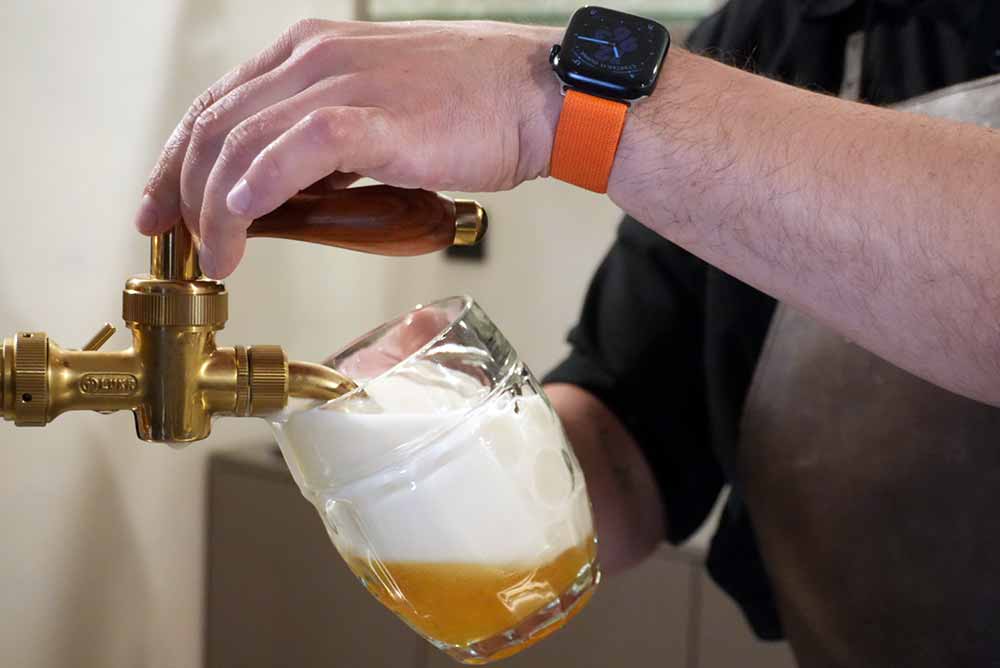
Photography courtesy of Grace Lee-Weitz | Hop Culture
Now, he can start pouring. Rozsypal says when they start their shift, each tapster can set the speed of their tap.
“That’s why normally one person stands behind his own tap,” he explains. “We set it at the beginning of our shift, and we’re not touching it, especially not during tapping.”
But Rozsypal cautions that pouring too fast can drastically affect the beer.
He shares a story of going to a favorite pub one night with his girlfriend after they changed the regular tapster. “They poured us a Šnyt, I tasted it and said, ‘Okay, no, that’s not the right taste,’” Rozsypal explains. “He was pouring so fast. It tasted like a Mlíko when the foam fell, so without any bubbles, any crisp. That was not what I wanted.”
It’s easy to get caught in the trap of pouring fast to save time. “But for properly poured beer and for the best beer, it’s okay to wait,” he says.
Rozsypal says a great tapster pays attention to the small details and practices.
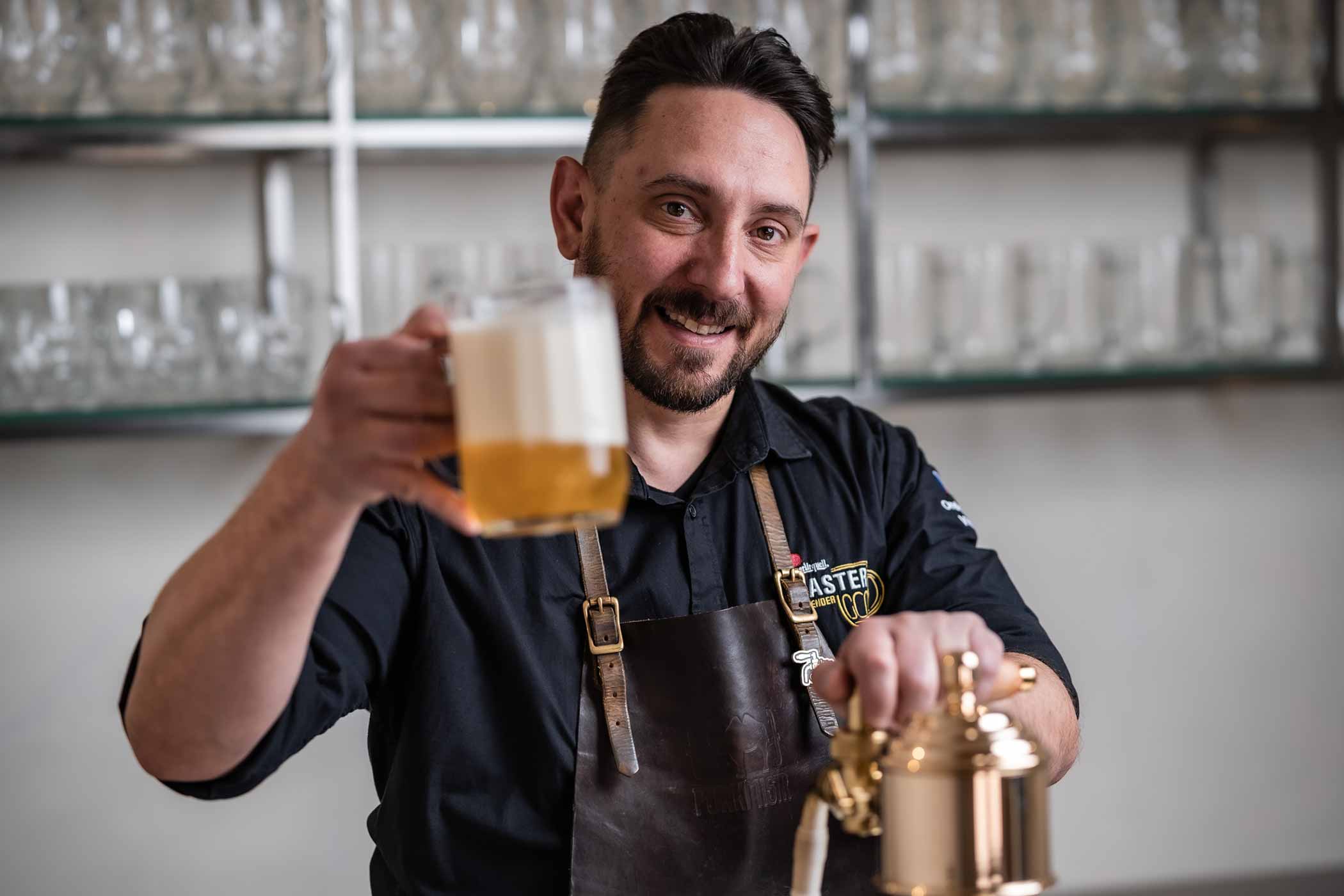
Photography courtesy of LUKR
“It’s similar to when you were in a driving school,” he says, reminding me that they typically drive manual in Czechia. “You want to get together all the movements with your foot stepping on the pedals and the movement with the lift. In the beginning, it was so hard, but after some years behind the wheel, it’s an everyday routine.”
Before LUKR, a typical day for Rozsypal lasted ten to thirteen hours. Like Hoppová, Rozsypal would come in at least one hour before each shift to open the bar and clean.
On Fridays at Lékárna, they cleaned all the draft lines like clockwork. “So my shift started at 6 or 7 a.m. and ended at 1:00 the following day!” he says.
On a busy night, Rozsypal would tap about 500 liters of beer across two taps. “So it was like 1,000 Hladinkas of only Pilsner Urquell beer,” he shares. “On a slow day, it was about 150 liters, or 300-400 beers, but I had some shifts where we tapped about 2,000 liters!”
Rozsypal speculates that he has tapped over one million beers during his entire career as a tapster.
Across each of them, he has just one goal. “We want perfectly poured beer in each pub over the world. … At the end [of the day], we want to serve the perfect beer to a customer,” he says. “And that’s it. That’s all. That’s the everyday routine for each tapster.”
Alexandr Vitek – On-Trade Quality Manager and Tapster at Budějovický Budvar
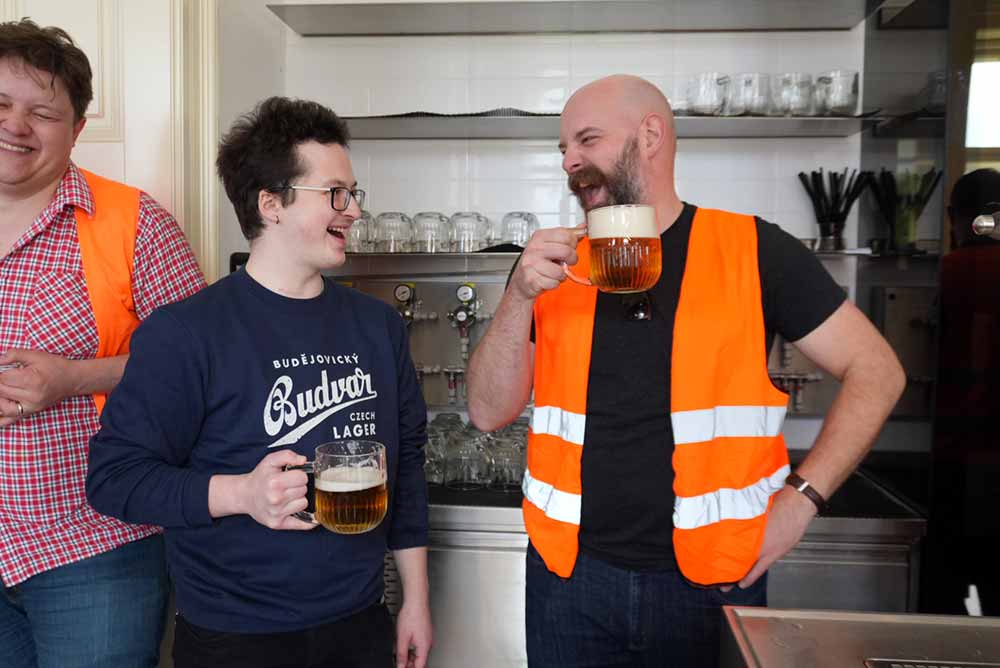
Photography courtesy of Grace Lee-Weitz | Hop Culture
Budvar’s Alexandr Vitek learned how to tap beer while still in high school (the legal drinking age in Czechia is eighteen), working at a local pub in his town, Pardubice, called U Toulavé Pípy.
His boss and the pub’s owner, Karel Kouřílek, saw Vitek had a passion for beer.
“He would teach me by [letting me] make mistakes,” says Vitek. “Whenever I did something wrong, he’d take me aside and say, ‘Okay, this is not what we do.’ He would make me do it correctly and try the original beer I poured incorrectly.”
Vitek says Kouřílek would make him taste both beers, asking the difference. Vitek realized, “Okay, maybe you’re right, and we are doing it for a reason, not just because.”
Kouřílek taught him that a great tapster does two things when they come in for a shift.
“When you enter any bar, you make yourself a coffee because the day is going to be long; you need every quiet minute you can get for yourself,” he laughs. “Jokes aside, the first thing you should always check is what state your colleagues left the place.”
In other words, again, you clean.
At U Toulavé Pípy, Vitek would arrive an hour before the pub opened at 5 p.m., cleaning the bar and the taps.
His shift often didn’t end until 2 a.m. or beyond.
“As for how long I stayed, I try not to talk about it because sometimes it was hours and hours,” he shares, noting that if friends dropped by, he might want to stay longer and drink. “But I normally went one hour before and one hour after.”

Photography courtesy of Zlý Časy
In 2019, Vitek moved to Prague to pursue a degree in environmental studies. On the side, he continued working as a tapster at Zlý Časy, translating to “Bad Times” in English. He worked there for five years before becoming Budvar’s on-trade quality manager, traveling to bars that serve Budvar beers and showing them the brewery’s proper way of tapping.
For example, when we talked back in May, he had plans to go to Slovakia to help a few bar owners who had previously visited Budvar perfect their pouring skills. “They went back to Slovakia, poured the beers in their own bars, and asked why it didn’t taste like what they had here,” says Vitek. “They came back to us and asked what we were doing wrong. This is why a position like mine exists, so I can go and say this is how you do it better.”
In his seven years as a tapster, Vitek says it often comes down to a few common mistakes.
If you don’t take care of your beer cellar, “How are you supposed to have a good final product when the place of origin in your bar is not good?” queries Vitek.
It all comes back to cleanliness, from the beer lines to the glasses themselves. “People don’t like to do the extra work often, like waiting for the glass to be properly cleaned, chilled, and rinsed,” he says. “It seems unnecessary, but it really does make a difference. It takes longer, but if you have a premium-quality beer, then you should want to take the extra few steps.”
He adds, “A beer matures for days and weeks. You can ruin it just because you don’t want to wait for thirty seconds.”
Beyond that, Vitek says he’s learned that a good tapster creates experiences, making customers feel comfortable and open to asking questions.
He emphasizes two traits a tapster should always have: “Communication and being open-minded,” Vitek says before adding after a quick pause: “And a liver of steel!”

